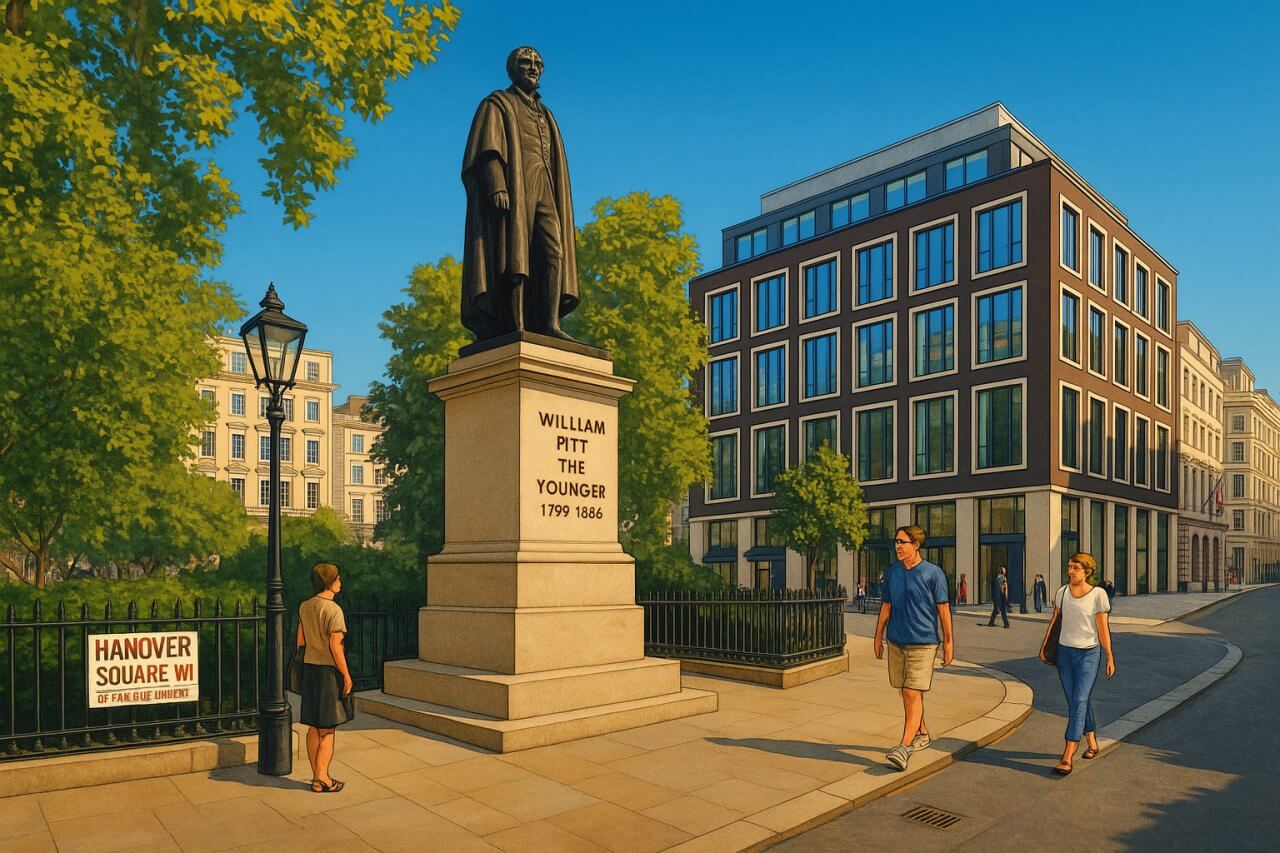
Hanover Square, London
Hanover Square is a prominent public square located in Mayfair, within the City of Westminster, central London. Known for its Georgian heritage and verdant garden centre, the square is encircled by roads of the same name and is a notable landmark in the West End of London. The square blends historic charm with modern affluence, offering an architectural feast and access to prestigious commercial and residential spaces.
Location and Surrounding Streets
Hanover Square is shaped roughly like a rectangle with a landscaped garden at its centre. It is bordered by roads bearing the same name—Hanover Square—forming a ring around the garden. These roads connect with:
- Brook Street to the southwest
- Harewood Place and Princes Street to the north
- Hanover Street to the east
- St George Street to the south
- Tenterden Street to the west
The roads around the square form a loop that permits two-way traffic in parts, though vehicle flow is heavily managed due to the proximity to Oxford Circus Station and major shopping thoroughfares. Traffic tends to be light within the square itself, with most vehicles using the surrounding connecting roads as through routes.
History and Etymology
Hanover Square was laid out in the early 18th century, with construction beginning around 1713 and continuing through the 1720s. It was one of the earliest squares built in what would become Mayfair and was designed as a prestigious residential enclave. The square takes its name from the House of Hanover, the German royal dynasty that ascended the British throne in 1714 with the coronation of King George I.
Hanover is pronounced HAN-uh-vuh or more formally /ˈhænəvə/
 .
.
Character and Atmosphere
The square combines elegance and formality with a sense of calm amid the bustle of central London. The buildings surrounding it are mostly late-Georgian or early Victorian in style, though some have been redeveloped into modern office and retail spaces. The square has long attracted embassies, hedge funds, private clubs, and medical specialists, while its garden offers a welcome green retreat for workers and visitors alike.
Points of Interest and Sights
Hanover Square is not only architecturally significant but also well-situated near a host of notable London landmarks. Some key highlights include:
- St George's Church, Hanover Square – Built in 1725, this Anglican church is located at the south-east corner and has long been a popular venue for society weddings.
- Hanover Square Gardens – The central green space features mature trees, benches, and seasonal flowerbeds, offering a peaceful escape just steps from Oxford Street.
- Nearby Galleries and Shops – The square is close to high-end boutiques along New Bond Street and cultural venues like the Royal Academy of Arts and the Handel & Hendrix Museum.
Property and Real Estate
Property values around Hanover Square are among the highest in London. As of mid-2025, prime commercial and residential space can command in excess of £3,500 per square foot (£37,675 per sq m). A typical two-bedroom flat of 1,200 sq ft (111.5 sq m) could sell for upwards of £4.2 million, depending on condition, view, and amenities. Prices here remain significantly above the London average due to its prestige, location, and architectural heritage.
Transport and Accessibility
Hanover Square is exceptionally well connected by public transport. The newly opened eastern entrance to Bond Street Station (Elizabeth Line and Jubilee Line) lies directly on the square, further boosting accessibility. The square is also within a short walk to:
- Oxford Circus Station – Serving the Bakerloo Line, Central Line, and Victoria Line
- Green Park Station – Connecting the Jubilee, Piccadilly, and Victoria lines
Nearby London Underground stations make Hanover Square a convenient hub for both residents and office workers. Multiple bus stops on Regent Street and Oxford Street serve routes towards Westminster, St James's, and other parts of London.
Fun Fact
Famed composer George Frideric Handel lived just around the corner from Hanover Square, and his regular walks to the square from Brook Street are commemorated today by the Handel & Hendrix in London museum. The square also became one of London's first major commercial locations to benefit from Crossrail, transforming it into a transport and property hotspot.
Quick Facts
- Location: Mayfair, City of Westminster, central London
- Named after: The House of Hanover (c.1714)
- Pronunciation: /ˈhænəvə/
- Main roads: Brook Street, George Street, Hanover Street, Princes Street, Tenterden Street
- Traffic: One- and two-way streets with limited access
- Green space: Hanover Square Gardens (public access)
- Nearby stations: Bond Street Station, Oxford Circus Station, Green Park Station
- Underground lines: Central, Jubilee, Bakerloo, Piccadilly
- Real estate (2025): Upwards of £3,500/sq ft (£37,675/sq m)
- Notable landmark: St George’s Church, Handel’s former neighbourhood
Map of Hanover Square, London

Painting of Hanover Square, London, with statue of William Pitt the Younger (View image in full size)